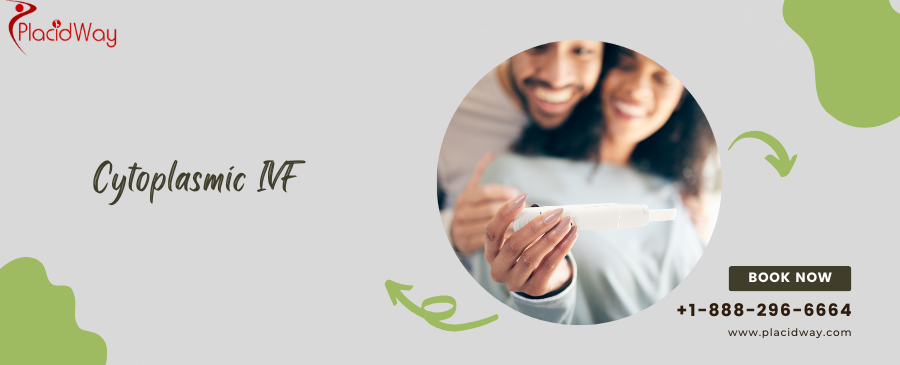
Unlock Fertility Potential: Understanding Cytoplasmic IVF Abroad
Facing fertility challenges can be an emotionally taxing journey, especially when conventional treatments haven't yielded the desired results. For many individuals and couples, the hope of starting a family rests on advanced reproductive technologies. One such innovative approach gaining attention, particularly in the realm of medical tourism, is Cytoplasmic IVF.
This procedure represents a cutting-edge option for those grappling with specific fertility hurdles, notably poor egg quality, which can stem from various factors including advanced maternal age or unexplained recurrent IVF failures. Unlike traditional In Vitro Fertilization (IVF), Cytoplasmic IVF involves a unique step: the transfer of a small amount of cytoplasm from a healthy donor egg into the patient's own egg. The goal? To rejuvenate the recipient egg's cellular environment, providing it with vital components – like healthy mitochondria – that may be lacking, thereby boosting its chances of successful fertilization, embryo development, and ultimately, a healthy pregnancy.
If you've been told your egg quality is a barrier, or if you've experienced multiple unsuccessful IVF cycles despite seemingly healthy embryos, you might be searching for answers using terms like "what to do for poor egg quality," "advanced IVF options," or "Cytoplasmic IVF for older women." This comprehensive guide will delve into every aspect of Cytoplasmic IVF, from understanding the underlying issues it addresses to exploring the procedure itself, its costs worldwide, and why many are choosing to pursue this promising treatment through medical tourism.
What are the common signs of poor egg quality affecting fertility?
Poor egg quality is a significant factor in female infertility, yet it doesn't always present with overt "symptoms" in the traditional sense. Instead, its indicators often emerge during fertility investigations or treatment. Patients frequently report:
- Difficulty getting pregnant: Despite regular, unprotected intercourse, conception doesn't occur.
- Recurrent miscarriages: Implantation may occur, but the embryo fails to develop correctly, leading to early pregnancy loss.
- Unsuccessful IVF cycles: This is a common and distressing sign. Even with egg retrieval and fertilization attempts, you might experience:
- Poor fertilization rates.
- Embryos that arrest development prematurely (e.g., not reaching blastocyst stage).
- Embryos that appear fragmented or abnormal under a microscope.
- Failure of seemingly healthy embryos to implant in the uterus.
- Diagnosis of low ovarian reserve: While not directly egg quality, a low ovarian reserve often correlates with a reduced number of high-quality eggs.
- Advanced maternal age: As women age, particularly beyond 35, the proportion of eggs with chromosomal abnormalities increases, directly impacting quality.
Many patients searching for "why can't I get pregnant" or "IVF not working" might ultimately find egg quality to be a contributing factor. These signs are clues that your eggs may lack the necessary components for robust early embryonic development.
What causes egg quality issues that might require advanced IVF techniques?
Understanding the root causes behind compromised egg quality is crucial for exploring appropriate treatments. Patients often look up "reasons for bad eggs" or "how to improve egg quality naturally." While some factors are modifiable, many are inherent:
- Advanced Maternal Age: This is the most prevalent factor. As a woman ages, the quality of her eggs naturally declines. This is due to an increased risk of chromosomal abnormalities (aneuploidy) and a decrease in mitochondrial function, which provides energy for cell division.
- Genetic Factors: Certain genetic predispositions can affect egg development and quality.
- Environmental Toxins: Exposure to pollutants, pesticides, and other environmental toxins can damage egg cells.
- Lifestyle Choices: Smoking, excessive alcohol consumption, poor diet, and high levels of stress can negatively impact egg health.
- Medical Conditions: Conditions like endometriosis, polycystic ovary syndrome (PCOS), thyroid disorders, and autoimmune diseases can sometimes affect ovarian function and egg quality. Previous ovarian surgery can also reduce ovarian reserve and potentially impact remaining egg quality.
- Oxidative Stress: An imbalance between free radicals and antioxidants in the body can lead to cellular damage, including to egg cells.
- Mitochondrial Dysfunction: Mitochondria are the "powerhouses" of the cell. If they are not functioning optimally within an egg, it can impair fertilization and early embryo development. This is a primary target for treatments like Cytoplasmic IVF.
For those searching "my eggs are poor quality what now," identifying these causes helps guide the conversation towards advanced options like Cytoplasmic IVF.
What exactly is Cytoplasmic IVF and how does it differ from traditional IVF?
Cytoplasmic IVF, sometimes referred to as "cytoplasmic transfer," is an advanced form of IVF designed to overcome specific issues related to egg quality. Imagine your egg as a battery that needs enough charge to power a complex process. If that battery is old or faulty, it might struggle. Cytoplasmic IVF aims to "recharge" it.
Here's how it works and how it differs from traditional IVF:
- Traditional IVF: Involves stimulating the ovaries to produce multiple eggs, retrieving them, fertilizing them with sperm in a lab (either naturally or via ICSI), and then transferring the resulting embryos into the uterus. The focus is on the quantity and fertilization of the eggs, assuming adequate quality.
- Cytoplasmic IVF (with Donor Cytoplasm):
- Egg Retrieval: The patient undergoes standard ovarian stimulation and egg retrieval.
- Donor Egg Selection: A healthy, young donor egg is retrieved (from a different donor, or sometimes the patient if they have some good eggs, though typically donor).
- Cytoplasm Transfer: A tiny amount of cytoplasm (the jelly-like substance surrounding the nucleus) is extracted from the donor egg. This cytoplasm contains vital organelles, particularly healthy mitochondria, which are crucial for cellular energy and division.
- Injection: This donor cytoplasm is then injected into the patient's own egg. The patient's egg retains its original nucleus (containing her genetic material) but gains the revitalizing components from the donor cytoplasm.
- Fertilization: The "enhanced" patient egg is then fertilized with sperm (typically via ICSI - Intracytoplasmic Sperm Injection) in the lab.
- Embryo Development & Transfer: The resulting embryo is cultured and, if successful, transferred to the patient's uterus, similar to traditional IVF.
The key difference is that Cytoplasmic IVF directly addresses cellular deficiencies within the patient's egg, offering a potential solution when the egg's internal environment is hindering successful development. This technique has been explored as a way to "rejuvenate" eggs without using a full donor egg, allowing the biological mother to contribute her genetic material.
Am I a good candidate for Cytoplasmic IVF?
Deciding if Cytoplasmic IVF is the right path for your fertility journey involves careful evaluation by a fertility specialist. This procedure is generally considered for specific patient profiles:
- Advanced Maternal Age: Women in their late 30s or 40s who are struggling to conceive due to age-related decline in egg quality.
- Recurrent IVF Failures: Individuals who have undergone multiple traditional IVF cycles without success, especially when poor embryo development (e.g., embryos not reaching blastocyst stage, high fragmentation) has been identified as the primary issue. Patients often search "IVF keeps failing what next."
- Poor Egg Quality Diagnosis: Women specifically diagnosed with compromised egg quality, characterized by low fertilization rates, poor cleavage, or abnormal embryo morphology in previous cycles.
- Mitochondrial Dysfunction Concerns: While not a definitive diagnosis for every case, patients whose eggs are believed to lack sufficient cellular energy due to mitochondrial issues might be considered.
- Reluctance for Full Egg Donation: For those who wish to use their own genetic material but are facing significant egg quality barriers that make traditional IVF highly unlikely to succeed, Cytoplasmic IVF offers a potential middle ground before considering full egg donation.
It's important to note that the efficacy and ethical considerations of Cytoplasmic IVF are still subjects of ongoing discussion and research globally. Not all clinics offer it, and regulatory stances vary. A thorough consultation with a reproductive endocrinologist specializing in advanced techniques is essential to determine your eligibility and discuss the potential benefits and limitations for your specific situation.
What should I expect during recovery after Cytoplasmic IVF?
Since the cytoplasmic transfer itself is a laboratory procedure performed on the eggs, the patient's physical recovery experience is essentially the same as that of a standard IVF cycle. There isn't a separate recovery process specifically for the cytoplasmic aspect. Patients typically experience two main phases of recovery:
- Post-Egg Retrieval:
- Immediate Recovery: After the egg retrieval procedure (performed under sedation), you'll typically spend a few hours in a recovery room.
- Common Symptoms: Mild cramping, bloating, and light spotting are common for a few days. You might feel tired or slightly groggy from the anesthesia.
- Activity: Most clinics recommend rest and avoiding strenuous activities for 24-48 hours. Many women return to light daily activities within a day or two.
- Medication: You'll likely continue or start new hormonal medications to prepare your uterus for embryo transfer.
- Post-Embryo Transfer:
- Immediate Recovery: The embryo transfer is generally a quick, painless procedure. You'll rest for a short period after.
- Symptoms: Mild cramping or spotting can occur, often due to the catheter passing through the cervix.
- Activity: While bed rest isn't typically required, many specialists advise taking it easy for a day or two, avoiding heavy lifting or vigorous exercise.
- The "Two-Week Wait": This is the period between transfer and your pregnancy test, often the most emotionally challenging part. You'll continue with prescribed medications (e.g., progesterone) during this time.
Throughout both phases, it's crucial to follow your clinic's specific instructions regarding medication, activity levels, and symptom monitoring. Report any severe pain, heavy bleeding, or signs of Ovarian Hyperstimulation Syndrome (OHSS) immediately. Patients often search "what to do after IVF transfer" or "IVF recovery tips." The key is patience, self-care, and adherence to medical advice.
What are the potential risks and side effects of Cytoplasmic IVF?
While Cytoplasmic IVF offers a beacon of hope, it's important to be fully informed about the potential risks and side effects, some of which are common to all IVF treatments, and others unique to this advanced technique:
General IVF Risks (applicable to Cytoplasmic IVF):
- Ovarian Hyperstimulation Syndrome (OHSS): A rare but serious complication from fertility medications, causing swollen, painful ovaries.
- Multiple Pregnancies: If more than one embryo is transferred, leading to twins or triplets, which carry higher risks for both mother and babies.
- Egg Retrieval Complications: Risks include bleeding, infection, or damage to surrounding organs (very rare).
- Ectopic Pregnancy: When the embryo implants outside the uterus, usually in a fallopian tube.
- Emotional Stress: The IVF process is demanding and can lead to anxiety, depression, and relationship strain.
Specific Risks & Considerations for Cytoplasmic IVF:
- Safety of Offspring: The primary concern is the long-term health and development of children conceived via cytoplasmic transfer. Because mitochondrial DNA from the donor egg is introduced into the recipient's egg, the resulting child will have nuclear DNA from the intended parents and a small amount of mitochondrial DNA from the donor. While initial studies showed no significant issues, long-term data is still limited, and regulatory bodies in some countries have expressed caution. Patients often search "is cytoplasmic IVF safe?"
- Genetic Anomalies: There's a theoretical risk of introducing new genetic changes or interactions due to the mixing of cytoplasm, though specific evidence is scarce.
- Ethical Concerns: The procedure involves three genetic contributors (two parents, one cytoplasmic donor), raising ethical questions about genetic identity and informed consent, which is why it's not widely approved or practiced in all regions.
- Limited Success Rates & Availability: Because of regulatory scrutiny and limited clinical application, robust, large-scale success rates are not as widely published or standardized as for traditional IVF. Not all clinics offer it.
- Donor Screening: Ensuring the health and genetic background of the cytoplasm donor is paramount to minimize potential risks.
It's crucial to have an open and detailed discussion with your fertility specialist about these risks and the current research findings. Understanding the "Cytoplasmic IVF pros and cons" is vital for making an informed decision.
How much does Cytoplasmic IVF cost worldwide?
The cost of Cytoplasmic IVF is a major factor for many prospective parents, particularly as it's often considered after other, less expensive treatments have failed. Because it's an advanced and specialized technique, it typically incurs higher costs than standard IVF. Prices vary dramatically based on the country, clinic reputation, included services (medications, genetic testing, donor fees), and the number of cycles required.
Here's an estimated cost comparison for a single cycle of Cytoplasmic IVF (or IVF with advanced techniques that might include similar methods, as C-IVF is often an add-on or specific clinic offering):
Estimated Cytoplasmic IVF Cost Comparison (Per Cycle)
| Country | Estimated Cost Range (USD) | Notes on Value |
|---|---|---|
| USA | $20,000 - $35,000+ | High costs; may include more extensive testing, but availability of C-IVF varies due to regulatory environment. |
| UK | $12,000 - $20,000+ (£10,000 - £16,000+) | Generally high costs, similar to Western Europe. Regulatory landscape for C-IVF is complex. |
| Mexico | $8,000 - $15,000+ | Significant savings, close proximity for North Americans, experienced specialists, relatively liberal regulations. |
| India | $5,000 - $10,000+ | Very cost-effective, high volume of patients, growing number of clinics with advanced tech. |
| Czech Republic | $6,000 - $12,000+ | Excellent quality care in Europe, competitive prices, strong regulatory framework for IVF generally. |
| Turkey | $5,000 - $11,000+ | Emerging medical tourism hub, modern facilities, often includes accommodation/travel packages. |
*Note: These are estimated ranges and can vary widely. It's crucial to get a detailed quote from specific clinics, including all associated costs like medication, consultations, and potential donor fees. "Cytoplasmic IVF cost" is a common search term, reflecting this crucial patient need.
Why should I consider traveling abroad for Cytoplasmic IVF treatment?
For many individuals and couples, the decision to seek fertility treatment abroad, especially for specialized procedures like Cytoplasmic IVF, is driven by several compelling factors:
- Cost Savings: This is often the primary motivator. As seen in the cost comparison, advanced fertility treatments can be drastically more affordable in destinations like Mexico, India, or the Czech Republic compared to the USA or UK, even when factoring in travel and accommodation. Patients often search "affordable IVF abroad."
- Access to Advanced Techniques: Some cutting-edge procedures, including specific forms of Cytoplasmic IVF, might not be readily available or legally permitted in your home country due to regulatory restrictions or lack of specialized expertise. Medical tourism offers access to clinics at the forefront of fertility innovation.
- Shorter Wait Times: In some countries, public healthcare systems or popular private clinics can have long waiting lists for fertility treatments. Traveling abroad can mean getting started on your treatment much sooner, which is critical in fertility where age can be a factor.
- Privacy and Anonymity: For many, undergoing fertility treatment is a deeply personal and sensitive journey. Receiving treatment abroad can offer a greater sense of privacy and discretion, away from local communities and social pressures.
- Comprehensive Care Packages: Many international clinics cater to medical tourists by offering all-inclusive packages that cover not just the medical procedure, but also accommodation, airport transfers, and interpreter services, simplifying the logistics of travel and treatment.
- Opportunity for a "Fertility Vacation": Combining treatment with a relaxing trip can reduce stress and offer a more positive psychological experience, which many believe can aid the success of fertility treatments.
Considering "IVF abroad success rates" and "best countries for fertility treatment" are common inquiries for those exploring this path.
Which countries offer the best value and quality for Cytoplasmic IVF abroad?
When seeking Cytoplasmic IVF or advanced fertility care internationally, certain countries have established themselves as leaders, balancing affordability with high-quality medical standards. These destinations are often highlighted when patients research "best IVF clinics abroad" or "fertility treatment in [country name]":
- Mexico: A top choice for North American patients due to its proximity and significant cost savings. Mexican clinics often boast state-of-the-art facilities, English-speaking staff, and highly experienced specialists. They are often less restricted by some of the regulations found in the USA, allowing for broader application of advanced techniques like cytoplasmic transfer.
- India: Renowned for its incredibly competitive pricing and highly skilled doctors, India has become a global hub for medical tourism. Many clinics offer advanced fertility treatments, often with very modern equipment and high patient volumes, leading to extensive experience.
- Czech Republic: This Central European nation is celebrated for its excellent healthcare standards and strict regulatory oversight for fertility treatments, ensuring high quality. It offers significantly lower costs than Western Europe and often shorter waiting lists. It's a popular choice for European patients and those looking for quality within the EU.
- Turkey: Bridging Europe and Asia, Turkey provides modern clinics with advanced technology and highly trained medical professionals, often at a fraction of the cost found in Western countries. Many clinics offer comprehensive packages catering to international patients.
- Greece & Spain: Also within Europe, these countries offer high-quality IVF treatments, often with more relaxed regulations regarding certain advanced techniques or donor anonymity compared to some other European nations, while still maintaining high medical standards.
When selecting a destination, consider factors like travel time, cultural differences, language barriers (though many clinics have translators), and the specific legal framework surrounding fertility treatments in that country, especially for novel procedures like Cytoplasmic IVF.
How can I ensure safety and quality when choosing a clinic abroad for fertility treatment?
Ensuring safety and quality is paramount when embarking on a medical journey abroad. It requires diligent research and careful consideration. Here's a checklist to help you make an informed decision:
- Accreditation and Certification: Look for international accreditations such as Joint Commission International (JCI), ISO certifications, or recognition by national fertility boards. These indicate adherence to global standards of care.
- Doctor's Qualifications and Experience: Research the specialists who will be treating you. Check their credentials, years of experience in fertility (especially with advanced techniques like Cytoplasmic IVF), affiliations with professional organizations, and patient testimonials.
- Clinic's Success Rates: Request transparent, audited success rates for procedures relevant to your case. Be wary of clinics that promise impossibly high success rates. Understand how their rates are calculated (e.g., live birth rates per embryo transfer, per cycle started, per egg retrieval) and compare them fairly.
- Technology and Facilities: Ensure the clinic uses modern equipment and adheres to strict laboratory standards for embryology, which is critical for IVF success. Ask about their embryology lab practices and quality control.
- Communication and Language Support: Confirm that there will be clear communication throughout your treatment. Many clinics catering to international patients offer English-speaking staff or dedicated translators.
- Patient Testimonials and Reviews: Seek out genuine reviews and testimonials from other international patients. Websites like PlacidWay can provide aggregated patient experiences and clinic information.
- Transparency in Pricing: Get a detailed, itemized quote that includes all potential costs: consultations, medications, specific procedures (like cytoplasmic transfer, ICSI), lab fees, and follow-up care. Clarify what's included and what might be extra.
- Travel and Accommodation Support: Inquire about assistance with logistics, such as airport transfers, accommodation arrangements, and local support, especially for procedures requiring multiple visits.
- Consider a Medical Tourism Facilitator: Reputable facilitators like PlacidWay can streamline the process, connecting you with accredited clinics, assisting with travel arrangements, and providing an extra layer of advocacy and support. They often have pre-vetted networks of high-quality providers.
By asking these critical questions and doing your homework, you can confidently navigate the world of medical tourism for Cytoplasmic IVF.
Take the Next Step with PlacidWay
Ready to explore treatment options abroad? Discover top clinics, compare prices, and get a free quote tailored to your needs with PlacidWay.
Fertility Treatment Abroad, Best Fertility Clinics





.png)
.png)
.png)
.png)

Share this listing